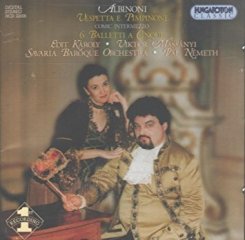Albinoni - Vespetta e Pimpinone • Sei Balletti à cinque (2002)
Albinoni - Vespetta e Pimpinone • Sei Balletti à cinque (2002)

Vespetta e Pimpinone 1.Intermezzo I: Aria: Chi mi vuol son Cameriera (Vespetta) 2.Intermezzo I: Recitative: Cerco la mia ventura (Vespetta, Pimpinone) 3.Intermezzo I: Duet: Nel petto il cor mi giubila (Pimpinone, Vespetta) 4.Intermezzo II: Recitative: Vespetta, tu lasciarmi (Pimpinone, Vespetta) 5.Intermezzo II: Aria: Guarda un poco (Pimpinone) 6.Intermezzo II: Recitative: Tacete, ah troppo an'chio (Pimpinone, Vespetta) 7.Intermezzo II: Aria: Io non son una di quelle (Vespetta) 8.Intermezzo II: Recitative: Cosi va ben, facciamo i nostri patti (Pimpinone, Vespetta) 9.Intermezzo II: Duet: Stendi, uh che allegrezza (Pimpinone, Vespetta) 10.Intermezzo III: Recitative: Io vado ove mi piace (Vespetta, Pimpinone) 11.Intermezzo III: Aria: So quel che si dice, e quel che si fa (Pimpinone) 12.Intermezzo III: Recitative: Per questa volta andate, ma presto ritornate (Pimpinone, Vespetta) 13.Intermezzo III: Aria: Voglio far come fan l'altre (Vespetta) 14.Intermezzo III: Recitative: Ma s'io giocassi e che diresta allora? (Pimpinone, Vespetta) 15.Intermezzo III: Duet: Se mai piu (Vespetta, Pimpinone) 6 Balletti a cinque: Introduzione I 16.I. Adagio 17.II. Allemanda 18.III. Gigha 19.IV. Gavotta: Presto 6 Balletti a cinque: Introduzione II 20.I. Grave 21.II. Allemanda: Allegro 22.III. Corrente: Allegro 23.IV. Sarrabanda: Presto 6 Balletti a cinque: Introduzione III 24.I. Adagio 25.II. Allemanda: Allegro 26.III. Gigha 27.IV. Gavotta: Presto 6 Balletti a cinque: Introduzione IV 28.I. Adagio 29.II. Allemanda: Allegro 30.III. Corrente 31.IV. Sarrabanda: Presto 6 Balletti a cinque: Introduzione V 32.I. Adagio 33.II. Allemanda: Allegro 34.III. Corrente: Allegro 35.IV. Gavotta: Presto 6 Balletti a cinque: Introduzione VI 36.I. Adagio 37.II. Allemanda 38.III. Corrente alla Francese 39.IV. Sarrabanda alla Francese Edit Károly (soprano) Viktor Massányi (baritone) Savaria Baroque Orchestra Pál Németh - conductor
In the early years of the eighteenth century, Apostolo Zeno and other dramatic poets began reforming the way serious operas were presented. It had been common practice to include comic scenes within a serious opera and to provide lavish entertainments known as intermedi between the acts. With the reforms, opera librettos were purged of comic scenes or characters, and extraneous spectacle was discouraged. However, the tradition of interweaving the acts of a smaller work of a contrasting genre between the acts of a larger, more serious work persisted, and the result was the emergence of the comic intermezzo. Albinoni's setting of Pimpinone is one of the earliest of the Venetian intermezzi to survive from this time period. It consists of three intermezzi with a linking plot. The first two were performed after the first and second acts, while the third was placed somewhere within the final act of the serious opera, as a respite during a scene change. The librettist of Pimpinone was Pietro Pariati. His text sparkles with wit, humor, repartee, and comic wrangling. The story contrasts two stock characters of Italian comedy, the guileful young female servant girl and the gullible old member of the Italian nobility. The themes are of social conflict between the classes, and the comedy satirizes everyday Venetian life. Albinoni's setting is marked by brief arias and duets, delightful, simple melodies, playful counterpoint, and a parlando style that looks forward to the buffo writing that emerged later in the century. The original performance of Pimpinone was given at the premiere of Astarto, a serious opera by Albinoni, at the Teatro S. Cassiano of Venice, in 1708. Pimpinone quickly became a standard work in the operatic repertoire and was performed internationally, as far away as Moscow and Ljubljana. Performance traditions grew up around pairs of players, such as Rosa Ungarelli and Antonio Ristorini, who specialized in comic roles and took the intermezzi from city to city and from theater to theater as they traveled. ---Rita Laurance, allmusic.com
download (mp3 @320 kbs):
yandex 4shared mega mediafire uloz.to cloudmailru








